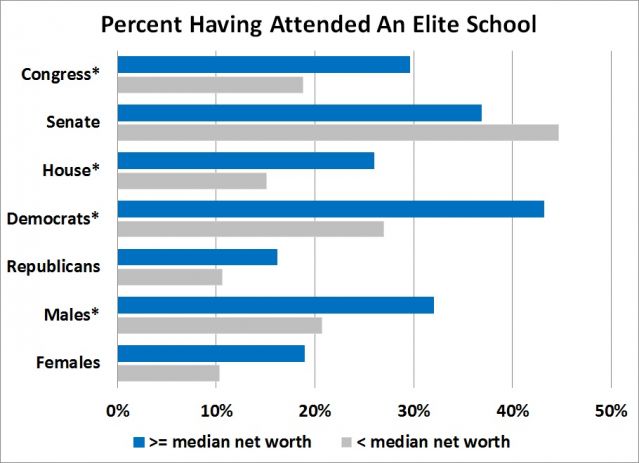Politics
Are Wealthier Congress Members Also Smarter?
Congress: Brains, wealth, and elite school attendance
Posted January 20, 2014

Recently the Center For Responsive Politics reported the majority of U.S. Congress members are millionaires. But are more educated (and perhaps brainier) Congress members more likely to have a higher net worth? Specifically, were wealthier congress members more likely to attend an elite undergraduate or graduate school that typically required high test scores for admission?
The definition of an elite school will vary depending upon who you ask and the criteria used. However, for the purposes of this analysis, let’s say an elite school is one for which the average test scores of a school put the typical student of that school roughly among the top 1 percent of scorers on a standardized test (for example, the SAT, ACT, GMAT, or LSAT) compared to the general population. For a full list of schools that met these criteria, see Table 1 of this research paper. To give examples of schools that have the highest average standardized test scores, here are the top five for undergraduate, business, and law in 2012:
Undergraduate: California Institute of Technology, Harvey Mudd College, Princeton University, Yale University, Harvard University.
Business: Stanford University, Harvard University, University of Chicago, Yale University, New York University.
Law: Yale University, Harvard University, Columbia University, New York University, University of Chicago.
The educational background of each Congress member was matched to their average net worth estimated by the Center For Responsive Politics in 2012, and basic demographic info such as gender and party was collected. The median net worth was calculated within each respective group and the percentage having attended one of these elite schools was compared between each group greater than or equal to the median net worth and each group less than the median net worth. In total, 628 Congress members (House and Senate) were examined with education and net worth data publicly available.
Although only the comparisons for Congress, the House, Democrats, and males were significant (as indicated by asterisks in the chart), a number of findings emerged. Senators were more likely than House members, Democrats more likely than Republicans, and males more likely than females to have attended one of these elite schools that likely placed them among the top 1 percent of test scorers. With the exception of the Senate, all comparisons illustrated the finding that wealthier Congress members were more likely to attend an elite school likely placing them in the top 1 percent of cognitive ability in the general population. More education and brainpower may be associated with greater wealth, even within members of the U.S. Congress.
© 2014 by Jonathan Wai
You can follow me on Twitter, Facebook, or G+. For more of Finding the Next Einstein: Why Smart is Relative go here.


